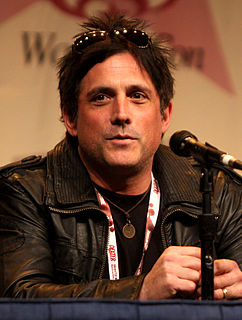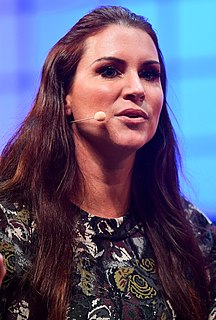A Quote by Maya Angelou
Hold those things that tell your history and protect them. During slavery, who was able to read or write or keep anything? The ability to have somebody to tell your story to is so important. It says: 'I was here. I may be sold tomorrow. But you know I was here.'
Related Quotes
There's something great about being a really young actor because you don't have a chance to be nervous. You don't know anything yet. Whereas one of the big challenges as you go through - I've been doing acting professionally for 10 years now - is to not let all the things that you know hold you back and make you more nervous. Once you've had a few people tell you that they don't like your ideas, that voice in your head can creep in that says, "Don't tell them what you think."
I don't ask my students to have studied film or any education in general. What I ask them is to come and sit and tell me a story, and the way they choose it and tell it, for me, the best criteria for whether they are right for making films. There's nothing more important than being able to tell your story orally.
I may not know the weight of those things, but I could feel the weight of that one, so I kept it to myself. You know that things aren't going well for you when you can't even tell people the simplest fact about your life, just because they'll presume you're asking them to feel sorry for you. I suppose it's why you feel so far away from everyone, in the end; anything you can think of to tell them just ends up making them feel terrible.
If you gauge how you're doing on whether somebody is responding vocally or not, you're up a creek. You can't do that; you kind of have to be inside of your work and play the scene. And tell the story every day. Tell the story. Tell the story. Regardless of how people are responding, I'm going to tell the story.
In old interviews I was still worried about being judged. I think my life was about how can I keep myself in control. How can I just get through this and be okay? And, you know, you turn the corner. You realize that you're not imprisoned by your life or your circumstances or your genetics or anything. I really believe that we all have the ability to come out of our story. But you have to tell your story first in order to come out of it.
The best time to tell your story is when you have to tell your story. When it's not really a choice. But then, when you get that first, messy, complicated version down, you have to read it over and be very tough on yourself and ask, 'Well what's the story here?' If you're lucky enough to have someone you trust looking over your shoulder, he or she can help you if [you] lack perspective on your own story.
Life is painful sometimes. It touches everyone, so you may as well try to look for other answers and find peace. So, it is difficult to write those types of things because nobody wants to tell sad stories. I think that I'll always tell stories about human hope. I would love to be able to tell somebody, "It's okay. It's all right. Be a good person." That's what my job is, in life.
Kids, if anything, are harder to write for because they are a more discerning audience. They will not stay with you if you go off on a tangent or if you give them extraneous information that doesn't serve the story. You really have to tell a tight story. You have to give them humor and suspense and believable characters. All those things that adults want too, but you have to be really on your game when you're writing for kids.






































